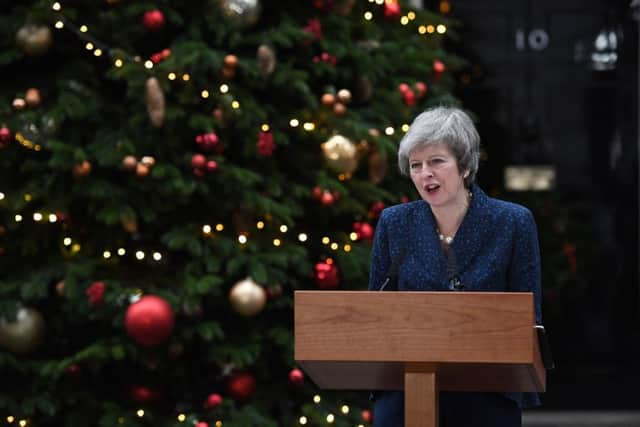Theresa May clings on but is urged to quit by Brexiteers
Mrs May had vowed to fight “with everything I’ve got” to remain Prime Minister, but signalled she would end her premiership after the UK leaves the EU to stem the anger at her handling of Brexit.
She won the secret ballot of MPs by 200 to 117, having needed a simple majority of 159 votes to survive. Under Conservative Party rules, Mrs May cannot now be ousted for a year.
Advertisement
Hide AdAdvertisement
Hide AdBefore the vote, one Tory MP supporting Mrs May was heard to say that they hoped the victory would “drive a stake through the heart” of the European Research Group of pro-Brexit parliamentarians.


However, the level of opposition is higher than expected and above the number of voted that supporters had briefed as a ‘safe’ margin, meaning her stay in 10 Downing Street could be cut even shorter.
The vote will also do little to end divisions within the Conservative Party over the EU with just weeks until the Commons must endorse a deal or allow the UK to leave without one.
Loyal MPs and ministers said the result was “good” and “clear”, but Nicola Sturgeon said the vote was “barely even a Pyrrhic victory” for a “lame duck Prime Minister saddled with a lame duck Brexit deal”.
Speaking in Downing Street following the result, Mrs May said MPs “now need to get on with the job of delivering Brexit”.
But she conceded that “a significant number of colleagues voted against me, and I have heard what they said”. The Prime Minister said she would go to a European Council summit today seeking “legal and political assurances” on the controversial Irish backstop proposal.
Appearing at a meeting of the backbench 1922 Committee to make her case before MPs cast their votes, Mrs May received an enthusiastic welcome with backers banging their desks in support.
Afterwards, solicitor general Robert Buckland told reporters: “She said ‘In my heart I would like to lead the party into the next election’ and then that was the introductory phrase to her indication that she would accept the fact that that would not happen, that is not her intention.”
Advertisement
Hide AdAdvertisement
Hide AdAnd Work and Pensions Secretary Amber Rudd said: “She was very clear that she won’t be taking the general election in 2022.”
Earlier, the Prime Minister’s political spokesman had said the Prime Minister “does not believe this vote today is about who leads this party into the next election, it’s about whether to change prime minister now.”
Other MPs indicated that Mrs May had promised to find a “legally binding solution” to ensuring that the UK does not get permanently trapped in a backstop arrangement to keep the Irish border open after Brexit - despite the EU’s insistence that no binding commitments are on offer.
Her decision to defer a vote on the proposed Brexit to avoid a humiliating defeat sparked a new wave of letters of no confidence from Tory MPs, pushing the total beyond the threshold of 48 needed to trigger a ballot.
Brexiteer Jacob Rees-Mogg, who had campaigned for weeks to trigger a confidence vote in Mrs May’s leadership, said he was not persuaded by the Prime Minister’s assurances.
After the vote he said the result was “terrible” for Mrs May, adding: “She ought to go and see the Queen urgently and resign.”
Fresh challenges await the Prime Minister today as she travels to Brussels for an EU Summit to ask fellow leaders for assurances that the backstop will never be used.
Trouble could break out again at Westminster, where the SNP group held a special meeting yesterday to discuss their response to the abandoned Brexit deal vote, and consider whether to lodge a motion of no confidence in the government that could trigger a general election if supported by Labour.
Advertisement
Hide AdAdvertisement
Hide AdResponding to the result, the Scottish First Minister said: “This result is barely even a pyrrhic victory for the Prime Minister, who has now admitted her time in office is limited.
“She may have clung on to the Conservative leadership, but her remaining authority has been fatally undermined.
“Even after being forced into saying she would stand down soon, almost 40% of her parliamentary group have voted against her – meaning presumably a majority of her backbenchers did so. In any normal situation, the Prime Minister’s position would be untenable.
“The crisis and chaos currently facing the UK is entirely a result of the vicious civil war that has engulfed the self-centred Conservative Party – at a crucial time in the UK’s history, it has a lame duck Prime Minister saddled with a lame duck Brexit deal.”
Mrs May was informed that she would face a ballot by the chairman of the 1922 Committee, Sir Graham Brady, in a phone call at 10.35pm on Tuesday, after a day of meetings with EU leaders in The Hague, Berlin and Brussels.
In an early morning statement outside 10 Downing Street, Mrs May warned that a change of prime minister would put the UK’s future at risk and could delay or halt Brexit, she insisted she would stay on to “finish the job”.
The Prime Minister cleared the decks to lobby Tory MPs for their backing, cancelling a planned meeting of Cabinet and a trip to Dublin for talks with Irish premier Leo Varadkar.
Despite the risk that her premiership could end within hours, Mrs May put in a bullish performance at Prime Minister Questions, watched by her husband Philip in the public gallery.
Advertisement
Hide AdAdvertisement
Hide AdTory elder statesman Kenneth Clarke told MPs that a leadership contest would be “irresponsible and unhelpful”.
None of the Prime Minister’s critics took the opportunity to attack her, while there was strong support from backbenchers including Neil O’Brien, who condemned “headbangers from all sides” for undermining her.
